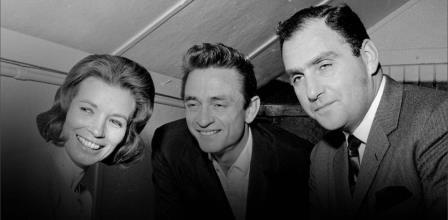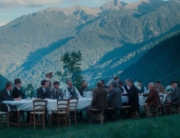My Father and the Man in Black settles two scores. One is the personal odyssey of a son, debut documentary director Jonathan Holiff, finally reconciling with the memory of his father who committed suicide in 2005 after a 20-year estrangement from his sons. But the second storyline is of wider interest because his father, Saul, was Johnny Cash’s longtime manager until 1973. This second, more intriguing angle, falls into the country music tradition of “the answer song,” responding to James Mangold’s Walk the Line (2005).
The revealing intersection of the personal and the public is made possible by Jonathan’s discovery, shortly after the Cash biopic opened, of an extraordinary trove of Saul’s personal archive from the career mostly unknown to the son. (Jonathan did know that he was named for Johnny Cash.) Not only was the storage locker full of memorabilia—handwritten letters, telegrams, posters, scrapbooks of clippings, gold records, and rare concert tapes—but also 60 hours of Saul’s taped phone calls with Cash and his own audio diaries. Saul poured out his experiences and feelings, about both his own family and the Cash’s, with a more caustic view of Cash’s fall and religious redemption than is usually portrayed in the legend of the Man in Black.
If the son doesn’t quite lift his father’s legacy to the level of Colonel Tom Parker or Brian Epstein, there is plenty of documentation here, in addition to Saul’s voice and quotes from interviews he gave to many biographers on how, through the 1960s, Saul expanded Cash’s reach through European tours and into bigger venues, including his personal capstone of Cash performing at the largest arena in Saul’s hometown Toronto. He says he, fatefully, suggested adding a girl singer in 1961, June Carter, and negotiated better record deals with new producers.
But the evidence in the archive also details the degree to which Saul ran interference when drugs and drink affected the quality of Cash’s performances, if he showed up at all, leading to law suits and financial losses that the manager had to settle. Saul also had to juggle controversies about Cash’s first wife, Vivian, who was being vilified in the right-wing press in 1965 with mocking photo captions as the singer’s “Negro wife.” After Cash’s arrest for drug possession in El Paso, Saul also takes credit for turning the outlaw image into good press by coming up with the idea of live prison concert recordings. (Saul’s image also runs counters to the usual stereotype of the conniving Jewish manager/recording executives of the period.)
Abruptly, the documentary reverses chronology by tracing how a Jewish storekeeper’s son ended up managing a Southern Baptist country artist a dozen years his junior. Born in Ontario in 1925, destitute in the Depression in a city then rife with anti-Semitism, and conned out of his money on the way to report to military service in 1943, Saul eventually headed to the periphery of the movie business in Los Angeles (much as his son would a generation later). Called back home due to his father’s ill health, he creatively promotes his new hamburger joint in the late 1950s by booking rock ‘n’ roll acts, including Bill Haley and Buddy Holly. After Cash came in 1958, he booked him for a Canadian tour, then beyond.
Saul’s perspective jumps ahead from the rocky times when he salvaged Cash’s career to its heights, soberly countering the conventionally happy ending of the redemptive power of June’s love and faith. From their 1968 honeymoon in Israel, the couple insisted Saul arrange a Holy Land concert for BBC radio and help them with a dream project of filming the life of Jesus. There’s even photos of Saul costumed as one of the Jewish priests judging against Jesus. (June, of course, was Mary). In the early 1970’s, while Saul tried to keep booking money-making venues, they toured more and more with Rev. Billy Graham’s Crusades and kept adding more gospel songs to their act, despite Columbia Records’ objections. June and Johnny not only pressed the reluctant Saul more and more to attend these religious programs, but by 1973, June, specifically, started demanding that Saul accept Jesus as his savior in order to continue as their manager—there’s a note to that effect in her handwriting in the archive. Saul accused them of anti-Semitism and quit—never revealing to the media what prompted the fallout and never sullying June’s image.
This is a strong story without the reconstructed scenes of Saul coming home and starting over again, going to college, boxing up his former life from his own family, and pouring out his heart into the tape recorder, amidst bouts of drinking and gambling. The rest of the film is the son struggling to understand his distant, morose father and reacting to revelations of the affection Saul hid. Inspired by the first-person documentary technique of Doug Block (51 Birch Street in 2005), the son/director could have trusted the powerful audio-visual material more, using the photographs and diary readings with the intensity of the Ken Burns or Morgan Dews’ Must Read After My Death (2007), instead of overplaying the reenactments and narration.







Leave A Comment